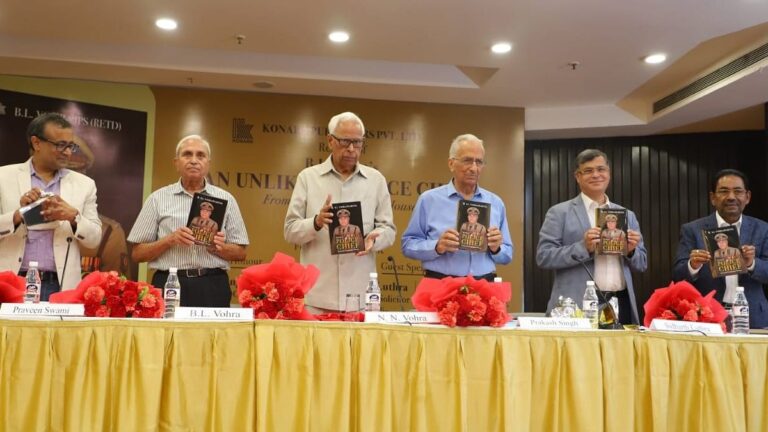
New Delhi: Former DGP and retired IPS officer Bhushan Lal Vohra has an advice for future IPS officers: “Stick to the rules and our Constitution and you will be inconvenienced.” Vohra was speaking at the launch of his autobiography An Unlikely Police Chief: From and To Jaisalmer House.
“Just like I was (thrown) from Delhi Police, to Manipur, then Kashmir and more, while others remained in their places. That requires one to compromise on certain principles which I will never do,” he said.
Published by Konark Publishers, the book was released Friday at New Delhi’s India International Centre (IIC) in the presence of eminent guests such as N.N. Vohra, former Governor, Jammu & Kashmir, Prakash Singh, former Director of General Police, UP & Assam, as well as former Additional Solicitor General of India, Sidharth Luthra and Praveen Swami, National Security Editor, ThePrint.
Also read: Arab Spring or Islamic winter? KP Fabian’s new ‘was and wasn’t’ book answers this question
Known fondly as ‘Bhushi’ within the IPS fraternity, Bhushan Lal Vohra joined the IPS in 1967 and had a noteworthy career. Growing up in the refugee camps of Bharatnagar, Vohra went on to serve as the DGP as well as state home secretary of Manipur and Tripura, where he fought against insurgency.
Journalist Vijay Kranti, who grew up with Vohra in the refugee camps, summed up the ex-IPS officer’s journey: “He grew up from the Son of Bharatnagar to the Son of Bharat”.
The book takes the reader through the riveting life of Vohra — from his humble beginnings at a refugee camp in Delhi where his family had to start from scratch after the horrific Partition in 1947, to clearing the IPS exam, to retiring as DGP in 2004. From getting his first job as a clerk at Jaisalmer House to leading various Central Armed Forces such as the BSF, the CRPF, the CISF among others in his fight against insurgency, to finally returning to Jaisalmer House in 2002 as the Director General of Police, the reader follows Vohra as he faces numerous struggles, raises questions about the police system and explores the intricacies of life as an IPS officer.
Jaisalmer House played a special role in Vohra’s life. “My first job as a Lower Division Clerk was at Jaisalmer House and after joining the IPS and becoming the Director General of Police, my office was yet again at Jaisalmer House. Only earlier I was on the ground floor and then I was on the first floor. It took me 38 years to climb 36 steps,” said Vohra, reminiscing the significance of the building.
Sharing his appreciation of and observations on the book, former DGP of Uttar Pradesh and Assam Prakash Singh said, “I was intrigued to realise that his story is quite literally rising from rags to riches,” adding that “It indeed happens to the most unlikely one of us”.
Sidharth Luthra called the book “honest, filled with candid observations, and which shows the intricacies within the functioning of the police”.
Praveen Swami highlighted the “interesting” questions Vohra has asked in the book: Who a good civil servant should be; what kind of hardships his generation had to face; the lack of funding and resources in the police today as well as the corruption in the different government institutions in the country.
Also read: Over 300 books, 2 rebirths later, iconic Tamil author Jeyamohan says translations are strange
Almost all guests present highlighted Vohra’s kindness and generosity. “His doors are always open, irrespective of who you are and your social standing,” said Luthra reminiscing about the numerous occasions Vohra came ahead to help people.
Through his book, Vohra aims to showcase the realities of ‘life as a police officer’, their journey behind the perceived luxuries and the drama around them that popular media tends to highlight.
“I hardly watch Bollywood films depicting police officers and rarely like them because they never show the real life of the police, the struggles and more”.
Apart from his autobiography, the former DGP has written 13 books, including Tripura’s Bravehearts: A Police Success Story of Counterinsurgency and Humour in Khaki: Anecdotes, Jokes and Funny Side of Police.
Vohra was awarded with the President’s Police Medal for Distinguished Service, ‘Guru Samman’, by then Vice-President Venkaiah Naidu in 2018 and the National Award for Protection of Human Rights in 2017 by All India Council of Human Rights.
While Vohra ended being a police officer, he said he had also dreamt of becoming a teacher. Today, he coaches civil services aspirants and conducts training workshops for corporates on soft skills.
When asked about his thoughts on the recent Agneepath recruitment scheme for the armed forces and the subsequent protests, Vohra said, “I think the Agneepath scheme is a good scheme, people will get jobs, even though it is for four years. They will become useful to themselves and the society. I believe the protests were more political”.